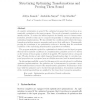180 search results - page 18 / 36 » Declarative Semantics of Input Consuming Logic Programs |
ICLP
2009
Springer
14 years 8 months ago
2009
Springer
Recently, enabling modularity aspects in Answer Set Programming (ASP) has gained increasing interest to ease the composition of program parts to an overall program. In this paper, ...
ENTCS
2008
13 years 7 months ago
2008
Traditional programming languages are algorithmic: they are best suited to writing programs that acquire all their inputs before executing and only produce a result on termination...
ENTCS
2007
13 years 7 months ago
2007
A compiler optimization is sound if the optimized program that it produces is semantically equivalent to the input program. The proofs of semantic equivalence are usually tedious....
JUCS
2006
13 years 7 months ago
2006
Abstract: Multi-adjoint logic programming represents a very recent, extremely flexible attempt for introducing fuzzy logic into logic programming. In this setting, the execution of...
ILP
2005
Springer
14 years 1 months ago
2005
Springer
Recursive loops in a logic program present a challenging problem to the PLP framework. On the one hand, they loop forever so that the PLP backward-chaining inferences would never s...

